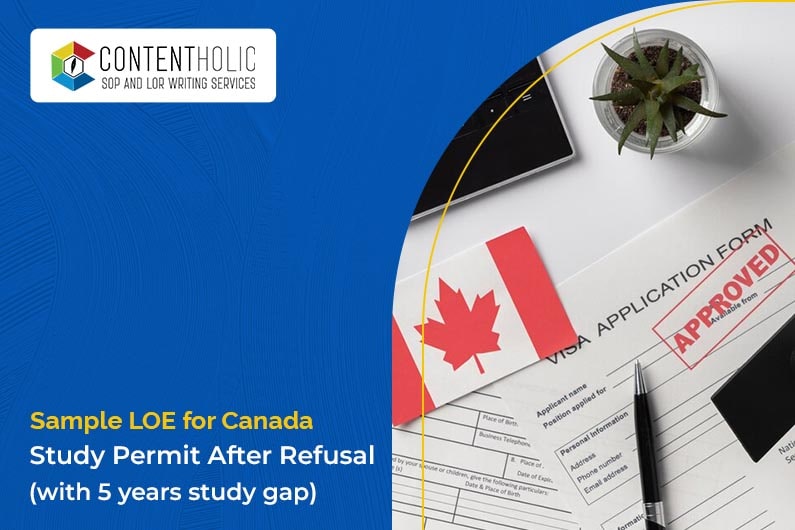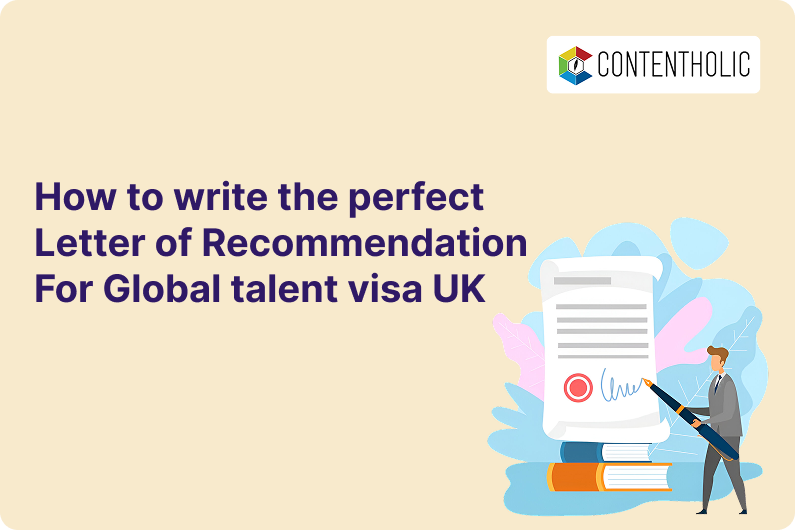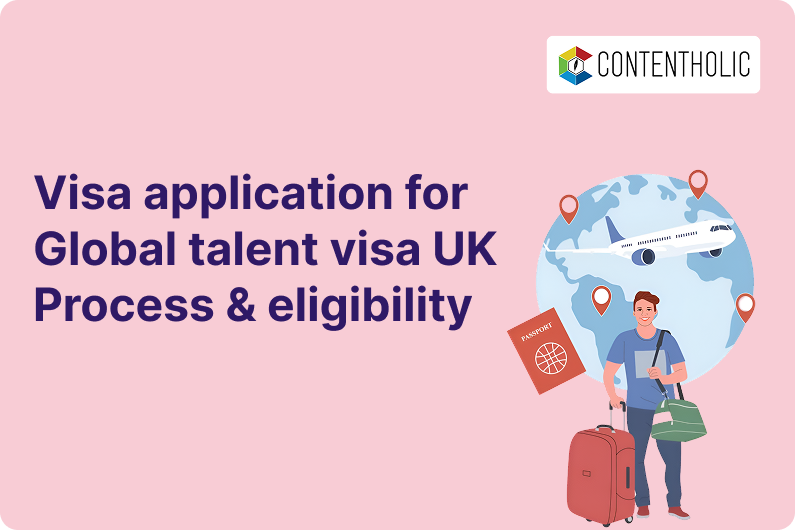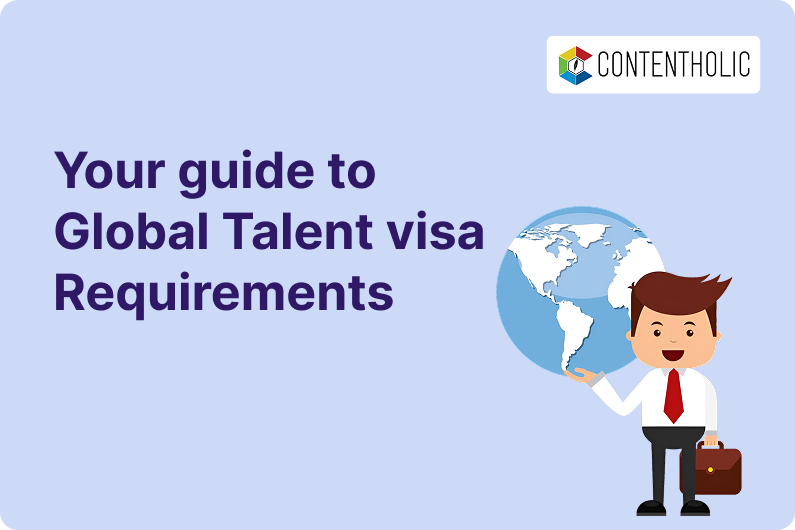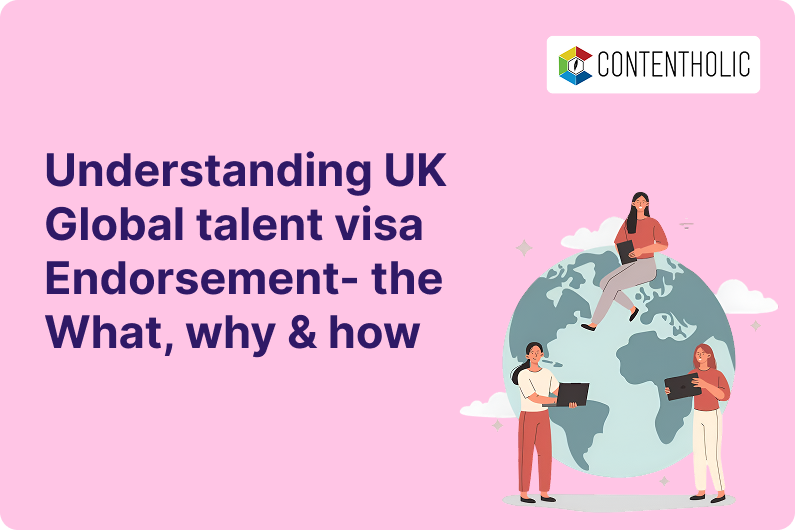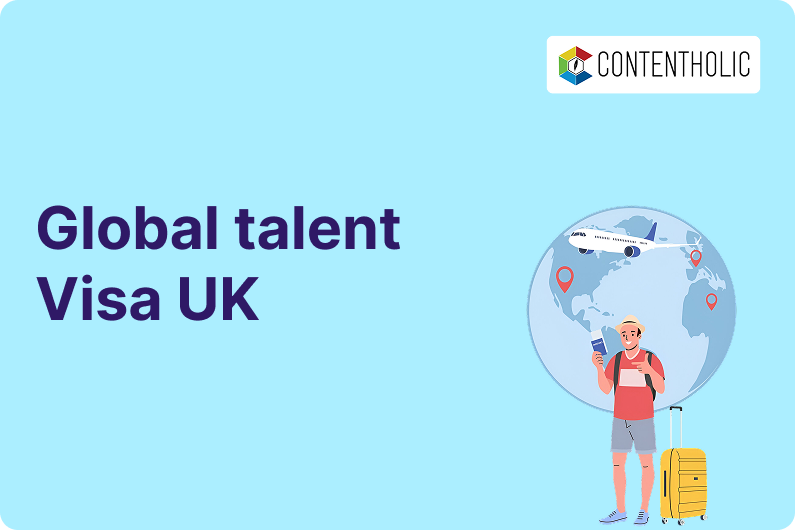Have you faced a Canada study visa refusal and have no idea how to address the study gap in your academic profile? Do not worry. A Letter of Explanation (LOE) is the ultimate solution to explain your situation to the visa officer. But first, let us explain what exactly is a letter of explanation. An LOE is a document that you can attach with your visa application to clarify any doubts or to provide additional information about certain aspects of your profile. In the case of a study gap, the study gap explanation letter gives a proper reason as to why there is a gap in your academic journey and why you wish to pursue the program in Canada after the particular gap.
In this blog, we are going to discuss all you need to know for writing an effective LOE, especially how to cover the study gap for Canada student visa after having already faced a refusal. You might also feel the need to seek professional help. We at Contentholic have a team of professional LOE writers who can craft a personalized LOE that can boost your chances of success.
Common Reasons for a Study Gap in Academic Journey
Before we tell you how to write a study gap explanation letter, it is important to know what are some common and acceptable reasons for a study gap that you can mention in your LOE. You can also take the help of a letter for a study gap explanation sample to get ideas about how to explain your own situation more clearly. We have listed some typical reasons below:
- Work Experience: This is the most common reason for a study gap. Students often choose to gain work experience before pursuing further education.
- Financial Issues: Some students might not have had the financial means to support their education in the past which could explain the study gap.
- Health Problems: Some students face serious health issues which leads them to take a break from their studies.
- Family Obligations: Sometimes personal or family obligations like taking care of a sick family member or seeing to any other family matter can also become a reason for the study gap.
These are just a few of the reasons, but you can also explain your unique situation in the LOE for the study gap in Canada after refusal.
How to Write a Study Gap Letter of Explanation for Canada After Refusal?
Now let us get into the main purpose of this blog; how to write an effective study gap explanation letter for a Canada study permit after refusal. If you take a look at some of the study gap explanation letter samples, you can see that there are some common key elements that all successful LOEs cover. Here we have outlined a simple guideline to create a strong and convincing LOE.
- Start with a Formal Greeting: The first thing to write in an LOE is the salutation where you will address the letter to the visa officer or the Immigration, Refugees and Citizenship Canada (IRCC).
- Introduce Yourself and State the Purpose of Writing the Letter: The first paragraph of your letter should be a brief introduction to yourself, including your name, passport number, the program and university you have enrolled in, and the reason for you to write the letter. State the reasons why you received the earlier visa refusal.
- Your Academic Background: Talk about your academic journey so far and highlight the achievements and skills you gained at different stages of your education.
- Explain the Reasons for the Study Gap: You have to be honest and transparent and not cook up stories when giving the study gap explanation. Take guidance from the study gap explanation sample as provided in this blog to understand the way you can effectively communicate your reasons for taking a break from your education. Make sure that you are clearly stating the reasons for the gap; whether it was a health issue, financial problem, a job, or any other reason. If you have any documents that can back up your claims, it is a good idea to attach them to your visa application. Just merely stating the reason is not enough, you also have to give details about what you did during that gap to demonstrate that you were still productive, for example, you were doing an internship, volunteered, or engaged in any other activity. If you paused your education due to some challenge, demonstrate how you have overcome it and are now ready to resume your studies.
- Work Experience: Describe any professional experience you had so far and how it aligns with your academic and career goals. Mention the skills, roles, and responsibilities you had during your working years.
- Why the Program and the College: Give the details about the program you have enrolled in and why you have chosen it. You can also connect your previous academic and professional experience behind your decision to choose the program. Talk about the college or university, and what attracted you towards it.
- Why Canada as Your Study Destination: It is important you include a why Canada section in your LOE for a study permit for Canada. You can talk about the quality of education, its social environment, and research opportunities, among other things.
- Financial Details: Assuring the visa official about your financial ability to live and study in Canada is essential for a successful visa application. Talk about all the ways you will be funding your education and living costs in Canada with the help of supporting financial documents.
- Why You Would Return After Your Studies: Mention all the reasons that will keep you tied to your home country. It can be family responsibilities, professional obligations, property ownership, or any other reasons. These reasons assure the immigration authority of your return after the completion of your studies in Canada.
- End the LOE with a strong Conclusion: Conclude your LOE by expressing your excitement about studying in Canada and assuring the visa officer that you have fulfilled all the visa requirements.
If you have never written an LOE, you should take the help of a study gap explanation sample. If you review some of the study gap explanation letter samples, you can get some inspiration about about to structure your own LOE, the level of language to be used, and what is the right approach to your explanation. There are many downloadable sources available online such as study gap explanation letter sample PDFs, that you can consider as your guide while writing your LOE for Canada study permit after refusal. Many applicants also find these LOE samples for Canada to be useful when tackling specific issues like study gaps to write their LOE professionally and convincingly.
Download PDF
 Download PDF of LOE for Canada Study Permit After Refusal With 5 years Study Gap
Download PDF of LOE for Canada Study Permit After Refusal With 5 years Study Gap
Below is a Letter of Study Gap Explanation Sample for the Canada Study Permit After the Refusal
To,
The Visa Officer,
High Commission of Canada
Sub: Application in response to study permit refused on xx/05/2022 (S30487XXXX)
Dear Sir/Madam,
I, hereby take this opportunity to introduce myself as Arjun Sampath, an Indian national, bearing passport number<add figure>. I am a qualified advocate wishing to transform my skills to integrate my learnings into the rich HR industry in India. However, to ascertain a full-fledged career as a legal practitioner and an HR consultant in the future, I certainly need to pursue formal training in this domain. Hence, I have chosen to pursue a Graduate Certificate in Human Resource Management at Niagara College while I chose Georgian College earlier. I have also received admission for the January 2023 intake from Niagara College but my visa refusal earlier has prompted me to write to you via the medium of this application and offer valid reasoning in support of my candidacy as a genuine temporary entrant to Canada.
The purpose of my rejection has been listed below:
I am not satisfied that you will leave Canada at the end of your stay, as stipulated in subsection 216(1) of the IRPR, based on the purpose of your visit.
Academic and professional history
From a very tender age, I knew how to express my emotions and speak the right words at the right time. This trait of mine often led my parents to talk about my communicative skills profoundly. At least they knew that I would also get attracted to such a profession(s). Hence, after completing my senior school in 2012, I enrolled in a five-year Bachelor’s program, BA LLB, and passed it in 2017. I also became an active member of the District Bar Association, Jalandhar followed by the completion of my graduation. Throughout my stint as an advocate, I had impressive exposure to dealing with different disputes and conflicts associated with legal agencies, civil workers, labor and employer issues, employee conflict arbitration, and resolution. Having rendered freelance services as an advisor to my father’s small-scale business firm, SR Trader, and another firm, Kuldip Kumar Raj Kumar, I became familiar with activities related to ensuring business processes, strategies, and actions comply with all relevant local, state, federal and international laws; Drafting, reviewing, completing, and filing legal contract related to business operation; handling cases regarding labor disputes, health and safety concerns and many more. It furthered my interest in the field of HRM as I realized how vital is its role in the new era of businesses and how much it is valued by larger corporations.
Motivation to pursue the program
I am the owner of an extrovert personality and possess a flair for fighting for others’ rights. As a result of this, I chose to study law in the initial days of my learning after school while I also have certification as an Advocate from the bar council in 2017. Over time, I have also worked as a legal advisor and consultant to well-established organizations which introduced me to the workings of a firm more intricately than otherwise. Time and again I have reformed their policies for refining the HR process which served as a great motivator for me to try my hands-on training as an HR professional. As I combine the working of a legal practitioner and an HR professional, I find the role of HR pivotal in deciding the success of an organization while framing policies in coordination with the legal practitioner. However, my understanding as a legal practitioner invigorated a desire in me to embrace the knowledge of human resources to solidify my foothold in bigger corporations in India which prefer hiring professionals offering a combination of legal expertise and HR knowledge. Anticipating a brighter future in this industry, I jumped to expanding my qualifications and giving my career a much-needed boost from advisory services to the role of a learned HR professional.
Why Canada and why Niagara College?
Canada is one of the warmest and most happening study destinations which also promises advanced training and education support to its international aspirants. I have conducted thorough research before finalizing this country as my future study. The proven facts around industry-intensive courses, umpteen colleges, dedicated faculty, diverse population, learning opportunities, and applied learning gave me solid reasoning towards embracing the opportunity to fulfill my education pursuits in Canada. Moreover, the idea of studying indigenously did not support the motive of gaining international exposure which I desperately want at this point in my career, especially considering my expansion to the arena of human resource management which is technically more advanced on the academic front in Canada than my country of residence. The study system in my country is based on conceptual learning while in Canada it is practically enriching and promises me to gain exquisite applied learning. However, my analysis of the course reviewed at Niagara College gives me enough confidence about the right selection of the study program based on my learning criteria. I will study topics such as HR Management Systems & HR Metrics, Organizational Training and Development, Business Management and Organizational Behavior, Employment Law, and Industrial and Labour Relations in which I am less proficient or possess a microscopic view in terms of performing at an organizational level. Hence, I want to enhance my understanding of the same and combine my legal knowledge of labor relations and welfare with modern HR practices. It will add to my future growth and promise to offer the right blend of skills to function in private and government corporations in my home country. By educating in this course, I would be able to create, implement, and evaluate employee-related activities and welfare schemes at an organizational level in which I am not well-versed. Hence, I strongly believe that it is the perfect study choice for me to equip myself with formal training at Niagara College. My research about the college convinces me about its advanced pedagogy and umpteen selection of industry-leading faculty members in its panel. The availability of a multicultural assortment and unbiased study atmosphere further fuels my confidence about studying at this college.
Reasons to return to India
My family is my strongest tie in India which includes my father, mother, and younger sister. I am the only son of my parents and legally the sole heir of my family assets. Therefore, my responsibilities are huge too. My parents depend on me as they grow older. My father is a businessman and agriculturist and my mother is an entrepreneur running a successful boutique. My younger sister has recently moved to Canada to fulfill her study plans, after which she will also return home just like me. I have responsibilities towards my younger sister too whose responsibility is on my shoulders as well. Our voluminous assets also need me to manage the entire property and wealth so that I can relieve my father from such duties. As I am closely attached to my family, I want to contribute to their financial freedom and serve them emotionally as much as they have contributed to my journey of success and served encouragement and support to follow my study pursuits back home.
Career Goals
I hold remarkable knowledge of legal aspects associated with firms and big organizations. However, to swiftly embrace a career in the HR industry, I must fulfill my short-term objective of gaining high-ended education and training in Canada. Gaining international exposure will expose me to a plethora of opportunities back home. I aim to combine my legal knowledge with the core understanding of modern HRM practices. Along with my knowledge of arbitration and conflict resolution within the firm HRM knowledge will help me play a crucial role in managing human capital and human resources more efficiently, especially in blue-collar multinational companies such as Netscape India Pvt Ltd., Air India, Indigo Airways, State Bank of India, Tech Mahindra Group, Reliance Industries, etc. Moreover, my in-depth knowledge of the human resource industry will allow me to fetch a rewarding career in companies like careerNet Technologies Pvt. Ltd., Quess Corp Ltd., Randstad India Pvt. Ltd., ManpowerGroup Services India Pvt. Ltd. Eventually, as I transform to become an entrepreneur and professional consultant in the longer run, I am sure that my learnings will help me in becoming an avid service provider and a human resource veteran.
Conclusion
I have thoroughly compared the financial implications of studying in Canada and with the sponsorship of my parents, I have been able to pay the tuition fee of CAD 18054 to the college and deposited CAD 10000 into the GIC account. Proof of payment has been enclosed herewith. My father and mother earn a total annual income of CAD 7924.83 and CAD 8073.11. We also own movable assets of CAD 49427.19 and immovable assets of CAD 494271.90. Evidence showing our financial worth has been attached herewith for your kind perusal. Having proved my financial eligibility, I have also keenly passed the language proficiency test to become eligible to study in Canada. I have obtained an overall score of 7.0 (Listening 8.5, Reading 6.0, Writing 6.5, Speaking 6.5). My IELTS scorecard is enclosed for your kind perusal.
I take full ownership of the details presented to you in this application and I pledge to follow all the Canadian Immigration Rules throughout my stay in Canada. I am greatly thankful for the opportunity to study in Canada which is my farthest dream come true and I promise to make every minute count with learning and enthusiasm. I shall be greatly obliged to you for allowing me a valid Canadian visa permit.
Yours Sincerely,
Arjun Sampath
 Download PDF of LOE for Canada Study Permit After Refusal With 5 years Study Gap
Download PDF of LOE for Canada Study Permit After Refusal With 5 years Study Gap
Additional Tips That Can Help You Write Effective LOE
- Give truthful reasons for your study gap. Misleading or over-the-top explanations can cause more harm than good for your application.
- Avoid jargon and complex sentences. Keep the language of the LOE simple and easy to understand.
- Attach all the supporting documents like medical records, employment verification, bank statements, etc to back your explanation.
- Proofread your letter. Check for grammar and spelling mistakes.
Final Note
With the help of this blog and the guidelines and tips suggested by it, you can ensure to come one step closer to fulfill your dreams of studying in Canada. Invest some time and thought while crafting your study gap explanation letter for Canada after refusal. You need to be honest and transparent about all the details and they should be backed up by valid documents. Take the help of study gap explanation samples to refer to the format and get ideas about how to effectively explain the refusal reasons including the study gap. If you need, get help from professional LOE writers. Whether you need help with the content or are unsure of the best way to express your situation, Contentholic can assist in drafting an LOE that highlights your strengths and explains your study gap effectively.
Frequently Asked Questions (FAQs)
1. Can the IRCC refuse my application if I have a study gap?
Yes, the IRCC can refuse your application if you have a study gap. A study gap may not be the sole reason for a refusal, but the lack of explanation of it can lead to suspicion about your genuine interest in pursuing education in Canada which can lead to refusal.
2. How much study gap is acceptable for higher education in Canada?
The study gap acceptable can vary depending on the education level you are planning to pursue in Canada. Generally, 2 years is acceptable for an undergraduate program and 5 years for a postgraduate program. A very long gap (such as 10 years or more) might raise concern for visa officials. Therefore, a well-crafted LOE can help the visa officer understand your situation and make a positive decision.
3. Can I explain my study gap in the LOE for a Canada student visa after refusal?
Yes, the letter of explanation (LOE) is the perfect document to explain your study gap. It allows for clarification that might have been raised earlier regarding your educational commitment. In this letter, you can explain your circumstances which let to pause on your education and demonstrate your readiness to resume your studies.
4. Can I use a sample SOP for Australian student visa?
Yes, you can use SOP for Australia student visa PDF samples, but only as guides. While writing your own SOP, you have to provide your genuine information and the motivations behind choosing to study in Australia.
5. What should be included in the study gap explanation letter for Canada?
In your study gap explanation letter for Canada, include the reasons for which you had to take a break in your education, how you spent your time in that gap, and what made you to pursue further education after the gap.
6. Where can I find a study gap explanation letter sample?
You can find many study gap explanation samples on Contentholic’s website that can be used for guidance while crafting your own letter.
7. What are the things that visa officials look for in a Letter of Explanation for a Canadian study permit?
The visa official will look at your academic and professional background, motivations behind the program and university choice, financial situation, and post-study plans. They will also review all the previous refusal reasons.

